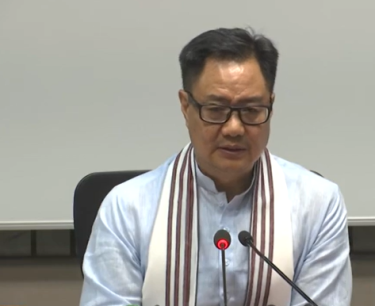
Union Minister for Parliamentary Affairs and Minority Affairs, Kiren Rijiju, declared on Sunday, July 14, that minorities in India are "well-protected and cared for." During his visit to Kargil, in the Union Territory of Ladakh, Rijiju emphatically stated, "In the whole world, minorities are safer and being looked after well in India only."
The minister's visit included inspections of Muharram arrangements and meetings with religious leaders at local institutions, including Islamia School and Imam Khomeini Memorial Trust (IKMT) Kargil. Rijiju highlighted Prime Minister Narendra Modi's contributions to minority welfare, claiming that no other leader has done as much for minorities in the country.
"The work done by Prime Minister Narendra Modi for the minorities of the country has not been done by anybody so far," Rijiju asserted. He dismissed what he termed as politically motivated negative narratives, urging people to ignore them. "As much as the minorities are safe in India, nowhere in the world is as safe," he reiterated.
However, Rijiju's confident assertions stand in stark contrast to concerns raised by Christian leaders just two days prior. On July 12, a delegation of bishops representing the Catholic Bishops' Conference of India (CBCI) met with PM Modi, conveying their apprehensions on various issues affecting the Christian community in India.
CBCI president Andrews Thazhath reported that they urged Modi to ensure peace in Manipur, a state grappling with religious and ethnic conflict that has reportedly resulted in the displacement of an estimated 70,000 Christians and the destruction of approximately 400 churches. The PM, according to Thazhath, characterised the situation as an ethnic conflict without communal undertones and assured that the government is taking steps to restore peace.
The bishops also expressed concerns about "increasing attacks" against Christians, allegedly under false accusations of forced conversions. In a letter submitted to PM Modi, the CBCI stated, "It is with a heavy heart that we express our anguish over the growing attacks on Christians and their institutions by antisocial elements in different parts of India." They clarified that the Church firmly opposes forced conversions.
The Catholic leaders raised issues regarding the rights of Christian Dalits and Tribals, appealing for the extension of reservation benefits to Dalit Christians and the preservation of existing reservations for Tribal Christians. They also requested the appointment of a Christian member to the National Commission for Minorities and the National Commission for Minority Education Institutions.
The meeting between the Catholic leadership and Modi was described as cordial, but with limited immediate progress on the substantive matters raised. Thazhath reported that Modi acknowledged their concerns but largely denied a government role in causing them, attributing issues to "fringe groups."
Additionally, the bishops highlighted challenges faced by Christian NGOs in renewing their registration under the Foreign Contributions Regulation Act, potentially impacting their social upliftment work across the nation. They also raised concerns about rumours suggesting the potential cessation of reservations for Dalit tribals, though Modi reportedly dismissed this as unfounded speculation.
The dichotomy between Union Minister Rijiju's confident assertions of minority protection and the Catholic bishops' detailed concerns highlights a disconnect in India's minority affairs discourse. Moreover, Rijiju's comments, coming just days after the bishops' meeting with PM Modi, raise questions about the government's responsiveness to minority issues and perhaps underscores the need for more nuanced dialogue to bridge the gap between official narratives and the experiences reported by religious minorities.




